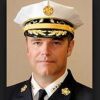For those who don’t know, the Cumberland Valley Volunteer Firemen’s Association (CVVFA) has been at the forefront of addressing several major fire service issues throughout the years, including roadway safety, protecting the fire service’s reputation, and now through their National Firefighter Code of Ethics.
I expect some of our brothers and sisters will not see the need for a code of ethics; after all, in community-wide surveys aren’t we usually the highest rated public service in terms of trust?
Yep, and that’s exactly why this story is important...
Setting aside the public communication and policy challenges generated by the current economic climate, there are certainly prominent examples of firefighters abusing the public trust that we have all (collectively) earned over the past 200-plus years; and that’s a problem.
People make mistakes, and firefighters are people. (Don’t tell anybody, but we’re NOT super-human.) Moreover, firefighters (career and volunteer) are subjected to continual physical and mental stresses that most people cannot imagine; that repeated trauma does lasting damage and can lead to negative behaviors that reflect poorly on our service.
Of course, I’ve never seen any evidence to suggest that firefighters are not (generally) worthy of the trust our citizens place in their fire departments.
In fact, every day we read story after story displaying the courage, bravery, and (often overly) selfless nature of firefighters across the globe.
And that’s why a code of ethics is a positive development; to help clearly articulate the values and expectations of those engaged in our important work (regardless of whether or not they are paid — when they’re having a bad day the public generally doesn’t know or care).
So, regardless of what you think of the specific tenets in the CVVFA example, take this opportunity to remember why you got involved in the fire and emergency services in the first place.
Stay safe!


